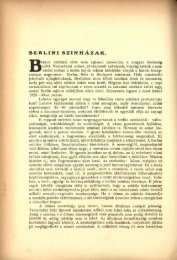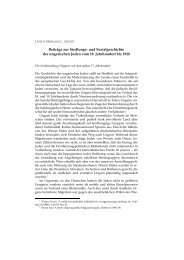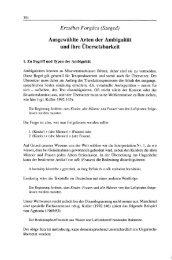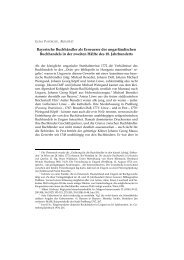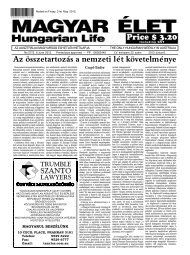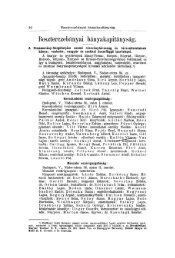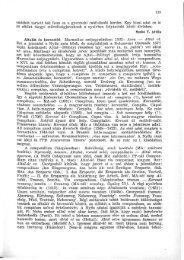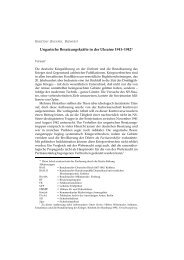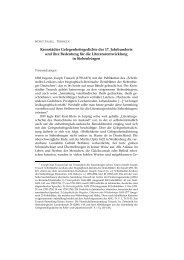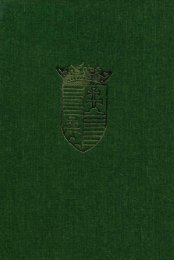hungarian studies - EPA - Országos Széchényi Könyvtár
hungarian studies - EPA - Országos Széchényi Könyvtár
hungarian studies - EPA - Országos Széchényi Könyvtár
Create successful ePaper yourself
Turn your PDF publications into a flip-book with our unique Google optimized e-Paper software.
DEZSŐ KOSZTOLÁNYI AND INTERTEXTUAL1TY 49<br />
This passage is taken from Richard Aczél's English translation of the novel.<br />
Aczél has succeeded in rendering the distinctive feature of the original. The words<br />
buzzing through Feri Füzes' head are clearly the hackneyed rhetoric of chivalry.<br />
For example, the word 'buzzed' reveals the implied author's skeptical stance toward<br />
Feri's appropriation of these words.<br />
There is one feature of the original Hungarian text, however, that deserves<br />
attention. In the Hungarian the words "provokálás" ("provocation"), "bandázs"<br />
("plastron"), and "öt lépés avansz" ("five paces forward") stand in stark contrast<br />
to the words "megverekedés" ("duel"), "becsületbíróság" ("court of honor"), and<br />
"végkimerülés" ("to the finish"). 34 The words in the first group are of Latin origin.<br />
The words in the second group are Finno-Ugric. This use of awkward loan<br />
words for which there are common Finno-Ugric equivalents in Hungarian reveals<br />
that Feri Füzes is attempting to adopt a language other than his own. A Hungarian<br />
would usually say "előre" for "forward." The word "avansz" is the Hungarian<br />
spelling of the French fencing term, "avance." This appropriation of another's<br />
speech depicts Feri Füzes as a fop who strives to ape fashionable affectations.<br />
Kosztolányi makes more blatant use of loan words when satirizing the political<br />
pretensions of the townspeople:<br />
At the opposite end of the table the men talked politics. They<br />
spoke of state delegations, constitutional crises and of Prime Minister<br />
Kálmán Széli.<br />
"Ah yes", Környey sighed. "A visionary statesman!.]"<br />
Priboczay, who was an old forty-eighter, became visibly heated.<br />
"No doubt because he went to Vienna for the unveiling of the<br />
Albrecht statue. He, prime minister of Hungary. For shame!"<br />
"Tactics", Környey replied."<br />
"Tactics", Priboczay nodded bitterly. "And when they ordered our<br />
boys out to the Hentzi statue in Pest? That was tactics too, I suppose?<br />
Bánffy would never have done such a thing. Never. Your man's a<br />
commoner today."<br />
"Raison d'état", Feri Füzes commented. 35<br />
Aczél again preserved vital features of the original. Introduced here as the utterances<br />
of the characters, the words "delegations", "constitutional crises", "visionary"<br />
and "raison d'état" represent a parodie stylization of political discourse.<br />
It is nevertheless worthwhile, however, to consider some of the features of the<br />
original. In the original, the English "talk politics" is "politizálni." 36 This is a verb<br />
created from the noun "politika" ("politics"). The noun is, obviously, a loan word.<br />
Just as "talk politics" is mocking, "politizálni" is always ironic. In the Hungarian<br />
text, however, this loan word accents more clearly the transition into a new language.<br />
It is then followed by a series of equally awkward loan words that a speaker


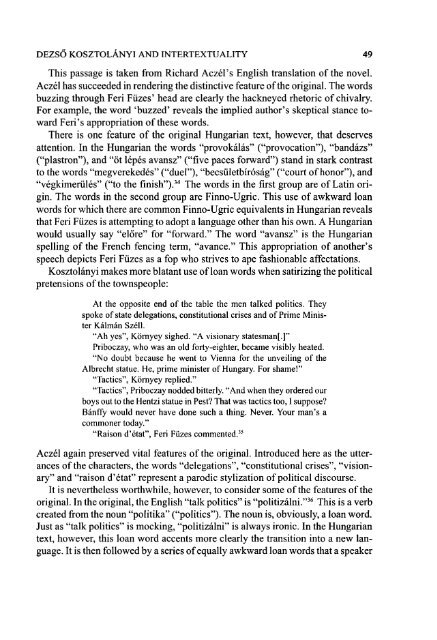
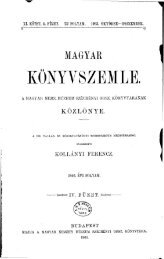
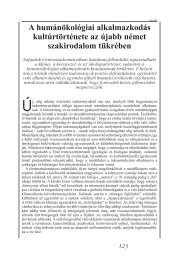
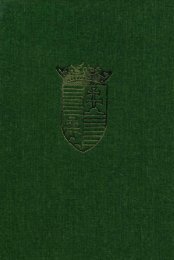
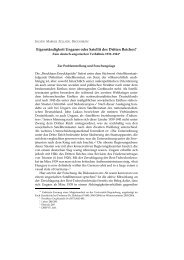
![Letöltés egy fájlban [36.8 MB - PDF] - EPA](https://img.yumpu.com/23369116/1/172x260/letoltes-egy-fajlban-368-mb-pdf-epa.jpg?quality=85)
